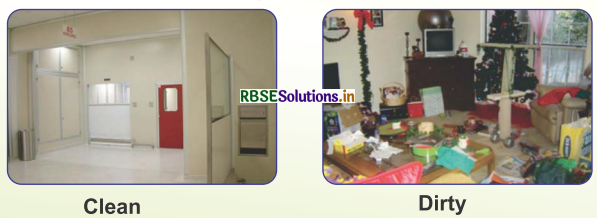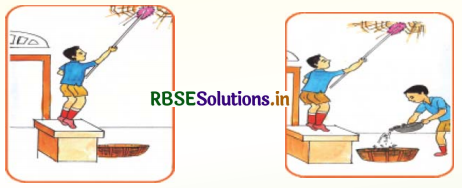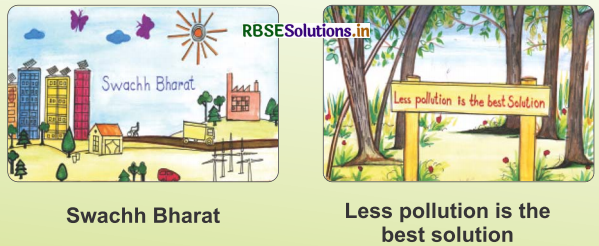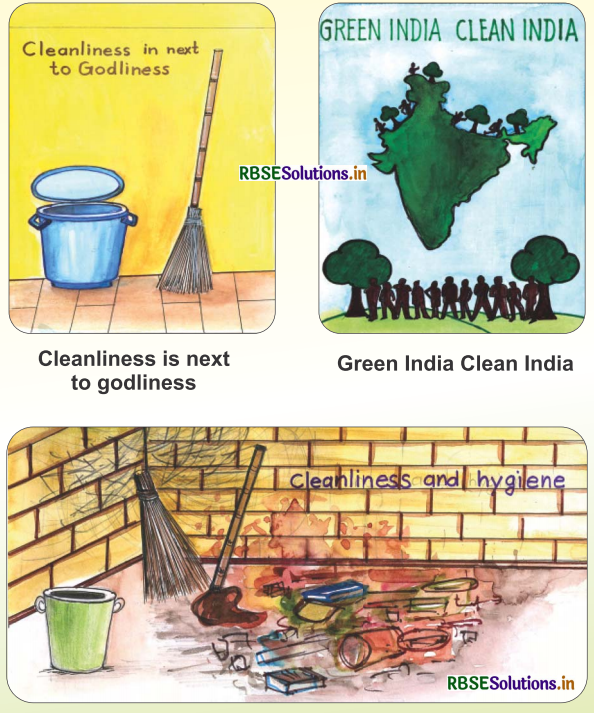RBSE Solutions for Class 3 English Chapter 5 Swachh Bharat Abhiyan
Rajasthan Board RBSE Solutions for Class 3 English Let's Learn English Chapter 5 Swachh Bharat Abhiyan Textbook Exercise Questions and Answers.
The questions presented in the RBSE Solutions for Class 3 English are solved in a detailed manner. Get the accurate RBSE Solutions for Class 3 all subjects will help students to have a deeper understanding of the concepts.
RBSE Class 3 English Solutions Chapter 5 Swachh Bharat Abhiyan
नीचे दिए गए चित्रों को देखिए

Discuss (विचार-विमर्श करें)
RBSE Class 3 English Chapter 5 Question Answer Question 1.
What do you see in these pictures?
आप इन चित्रों में क्या देखते हो?
Answer:
We see that one house is clean and another is dirty.
हम देखते हैं कि एक घर साफ है तथा एक घर गंदा है।

Swachh Bharat Abhiyan Question Answer Question 2.
Do you clean your room/house daily?
क्या आप अपना कमरा/घर प्रतिदिन साफ करते हो?
Answer:
Yes, we clean our room/house daily.
हाँ, हम अपना कमरा/घर प्रतिदिन साफ करते हैं।
Class 3 English Chapter 5 Question Answer Question 3.
Why should we keep our surroundings clean?
हमें अपने चारों ओर सफाई क्यों रखनी चाहिए?
Answer:
We should keep our surroundings clean to make us healthy.
हमें स्वस्थ रहने के लिए अपने चारों ओर सफाई रखनी चाहिए। अब हम कहानी पढ़ते हैं
Activity-I.
A. Answer the following questions in brief
निम्न प्रश्नों के उत्तर संक्षिप्त में दीजिए
Class 3 Sanskrit Chapter 5 Question 1.
What was Arun doing?
अरुण क्या कर रहा था?
Answer:
Arun was doing his homework.
अरुण अपना गृहकार्य कर रहा था।
Chapter 5 Class 3 English Question 2.
Where should we throw the garbage?
हमें कचरा कहाँ फेंकना चाहिए?
Answer:
We should throw the garbage into the dustbin.
हमें कचरा कूड़ादान में फेंकना चाहिए।

English Lesson Number 5 Question 3.
Where was Arun going with his mother?
अरुण अपनी माँ के साथ कहाँ जा रहा था?
Answer:
Arun was going to market with his mother.
अरुण अपनी माँ के साथ बाजार जा रहा था।
Swachh Bharat Abhiyan Class 3 Question 4.
What made the floor dirty?
फर्श गंदा किससे हो गया?
Answer:
The crumbs and the pencil lead powder made the floor dirty.
पेन्सिल के छिलके तथा लेड के चूरे से फर्श गंदा हो गया।

Swachh Bharat Abhiyan In English Question 5.
What can we do to make our country clean?
हम हमारे देश को स्वच्छ बनाने के लिए क्या कर सकते हैं?
Answer:
We can keep our surroundings clean and throw the garbage into the dustbin to make our country clean.
हम हमारे देश को स्वच्छ बनाने के लिए अपने पास-पड़ोस को साफ कर सकते हैं तथा कचरे को कचरा-पात्र में फेंक सकते हैं।
B. Fill the blanks by choosing the appropriate words that are given in the box.
बॉक्स में दिए शब्दों में से उपयुक्त को चुनकर रिक्त स्थानों की पूर्ति कीजिए।
garbage, homework, city, pencil, dustbin.
1. Arun was doing his...................
2. There was a heap of.................near the wall.
3. We must keep our...............clean.
4. Arun threw the wrapper of toffee into the....
Answer:
1. homework
2. garbage
3. city
4. dustbin
Activity-II.
A. Make two or three words by using the letters of the given word.
दिए गए शब्द के अक्षरों (वर्तनी) का प्रयोग करते हुए दो या तीन शब्द बनाइए।
The first one is done for you.
healthy - tea, tale, heat.
garbage ....................
dustbin ....................
pencil ....................
Answer:
garbage : bag - age - garage
dustbin : dust - tub - in
pencil : pen - nice - lip
B. Write one word for each of the following group of words given below. First letter is given for you.
दिए गए समूहों के लिए एक या दो शब्द लिखिए। आपके लिए प्रथम अक्षर दिया गया
1. small dusty particles of the pencil.
c. ....................

2. waste paper or food that you throw away.
g. .................

3. a large container with a lid used for putting garbage.
d. ..........


4. an open area or building where we go to buy things.
m..........

Answer:
1. crumbs - छिलके
2. garbage - कचरा
3. dustbin - कूड़ादान
4. market - बाजार
C. Look at the following pictures
निम्न चित्रों को देखिए -

The word 'clean' and 'dirty' are opposites in meaning.
शब्द clean (साफ) और dirty (गन्दा) अर्थ में एक-दूसरे के विलोम शब्द हैं।
Look at the following pictures and fill in the blanks with the word opposite in meaning with the given word.
निम्न चित्रों को देखिए तथा दिए गए शब्दों के अनुसार रिक्त स्थानों को विलोम शब्द से भरिए।
Answer:



Activity-III.
A. Look at the following pictures and read the sentences given below them.
निम्न चित्रों को देखिए तथा उनके नीचे दिए गए वाक्यों को पढ़िए।

I am cleaning the room.
(मैं कमरा साफ कर रहा हूँ।)
We are cleaning the room.
(हम कमरे को साफ कर रहे हैं।)
Now complete the sentences given below using 'I' and 'We'.
अब 'I' (मैं) तथा 'We' (हम) का प्रयोग करते हुए नीचे दिए गए वाक्यों को पूरा कीजिए।
1. ............. am playing.
.............. are playing
2. ........... .am reading a book.
........... are reading books.
3. ................ am sitting in a chair.
................. are sitting on chairs.
4. ........... am eating food.
................ are eating food.
5. ..............am flying a kite
.........are flying kites.
Answer:
1. I am playing.
We are playing.
2. I am reading a book.
We are reading books.
3. I am sitting in a chair.
We are sitting on chairs.
4. I am eating food.
We are eating food.
5. I am flying a kite.
We are flying kites.

Activity-IV
A. Recite the poem after your teacher.
अपने अध्यापक के पश्चात् इस कविता को ऊँचे स्वर में बोलें।
Cleanliness, cleanliness,
It is next to godliness.
Keeping our earth clean,
Is our duty and has ever been.
Throw the litter in dustbin,
Avoid using polythene.
Keeping our earth clean,
Is our duty and has ever been.
Answer:
[Class Activity.]
B. Discuss the importance of cleanliness in groups. Discuss with your friends how to avoid using polythene.
समूह में स्वच्छता के महत्त्व पर विचार-विमर्श कीजिए। अपने मित्रों से विचार-विमर्श करें कि पॉलिथिन के प्रयोग/उपयोग से कैसे बचा जाये।
Answer:
Importance of Cleanliness
(स्वच्छता का महत्त्व) :
1. Cleanliness means keeping our body, mind and everything around us clean.
स्वच्छता से तात्पर्य है हमारे शरीर, दिमाग तथा हमारे चारों ओर की प्रत्येक चीज को स्वच्छ रखना।
2. Cleanliness is important for healthy mind, body and environment.
स्वच्छता स्वस्थ दिमाग, शरीर तथा पर्यावरण के लिए महत्त्वपूर्ण है।
We can avoid using polythene with the following points :
निम्न बिन्दुओं के द्वारा हम पॉलिथिन के प्रयोग से बच सकते हैं :
1. By not buying items packaged in polythene.
पॉलिथिन में पैक वस्तुओं को नहीं खरीद कर।
2. By using cloth and jute shopping bags.
कपड़े तथा जूट के खरीददारी थैलों का प्रयोग करके।

Activity-V.
Look at these posters and read the slogans.
इन पोस्टरों को देखिए तथा स्लोगनों (नारों) को पढ़िये।


Now write these slogans in your notebook.
अब इन नारों को अपनी कॉपी में लिखिए।
Answer:
1. Swachh Bharat
स्वच्छ भारत
2. Less pollution is the best solution
कम प्रदूषण सबसे बेहतर हल/समाधान है
3. Cleanliness is next to godliness
स्वच्छता भक्ति से भी बढ़कर है

4. Green India Clean India
हरा-भरा भारत स्वच्छ भारत
5. Cleanliness and hygiene
स्वच्छता और स्वास्थ्य
Seen Passages
Passage 1.
Arun was doing his home work. He drew something on a piece of paper but he didn't like it. He tore the paper from the notebook and threw it into the room. He sharpened the pencil in anger. The crumbs and the pencil lead powder fell onto the floor. This made the floor very dirty.
1-2. निम्नलिखित प्रश्नों के उत्तर अंग्रेजी में दीजिए
1. Who was doing his homework?
2. How did he sharpen the pencil?
3-4. निम्नलिखित प्रश्नों के उत्तर हिन्दी में दीजिए
3. उसने कागज फाड़कर कहाँ फेंका?
4. फर्श पर क्या गिर गया था?
5. गद्यांश में से वे शब्द लिखिए जिनके अर्थ हैं
(i) गुस्सा
(ii) फर्श
Answers :
1. Arun was doing his homework.
2. He sharpened the pencil in anger.
3. उसने कागज फाड़कर कमरे में फेंका।
4. फर्श पर पेन्सिल के छिलके तथा लैड पाउडर गिर गया था।
5. (i) anger
(ii) floor
Passage 2.
His mother called him, "Arun, come here quickly! We have to go to market to buy a few things". Arun went to market happily. While they were walking on the side of the lane, he smelt foul air. There was a heap of garbage near the wall. There were many flies and mosquitoes on the garbage.
1-2. निम्नलिखित प्रश्नों के उत्तर अंग्रेजी में दीजिए
1. Why did the mother call him?
2. How did Arun go to market?
3-4. निम्नलिखित प्रश्नों के उत्तर हिन्दी में दीजिए
3. दीवार के पास किसका ढेर था?
4. कचरे पर क्या थे?
5. निम्नलिखित के बहुवचन (plurals) बनाइए
(i) mother
(ii) mosquito
Answers :
1. The mother called him to go to market to buy a few things.
2. Arun went to market happily.
3. दीवार के पास कचरे का ढेर था।
4. कचरे पर मक्खियाँ तथा मच्छर थे।
5. (i) mothers
(ii) mosquitoes

Passage 3.
Arun asked her "What should we do"? His mother said, "We must always keep our surroundings clean and throw the garbage into the dustbin only. It will make our city clean and healthy." They reached the market. Arun opened the wrapper of toffee and threw it into the dustbin. In the evening, he returned home and cleaned up his room. He promised his mother, “I will also develop the habit of cleanliness and make India clean and healthy."
1-2. निम्नलिखित प्रश्नों के उत्तर अंग्रेजी में दीजिए
1. Where did Arun throw the wrapper?
2. What did he do in the evening?
निम्नलिखित प्रश्नों के उत्तर हिन्दी में दीजिए3. हम हमारे शहर को स्वच्छ तथा स्वस्थ कैसे बना सकते हैं?
4. अरुण ने अपनी माँ से क्या वादा किया?
5. निम्नलिखित शब्दों के हिन्दी अर्थ लिखिए
(i) clean
(ii) throw
Answers :
1.Arun threw the wrapper into the dustbin.
2. He cleaned up his room in the evening.
3. हम पास-पड़ोस को साफ रखकर तथा कचरे को कूड़ादान में फेंककर, हमारे शहर को स्वच्छ और स्वस्थ रख सकते हैं।
4. अरुण ने अपनी माँ से वादा किया कि वह भी भारत को स्वच्छ और स्वस्थ बनाने की आदतें विकसित करेगा।
5. (i) साफ करना
(ii) फेंकना
Swachh Bharat Abhiyan Summary and Translation in Hindi
Arun was ................ very dirty. (Page 78)
कठिन शब्दार्थ-surroundings (सराउन्डिज) = पास-पड़ोस । clean (क्लीन्) = साफ करना, साफ। home (होम्) = घर । drew (ड्र) = चित्र बनाया। something (सम्थिङ्) = किसी/ कोई चीज। piece (पीस्) = टुकड़ा। paper (पेप()) = कागज। like (लाइक्) = पसन्द करना। tore (टॉ()) = फाड़ा। threw (श्रू) = फेंका। room (रूम्) = कमरा । sharpen (शाप्न्) = तेज करना । anger (ऐङ्ग()) = क्रोध, गुस्सा। crumbs (क्रम्स्) = छिलके। lead (लेड्) = पेंसिल के अन्दर का काला पदार्थ, लेड। powder (पाउड()) = चूरा पाउडर। fell (फेल्) = गिरा। floor (फ्लोर) = फर्श dirty (डटि) = मैला, गंदा।
हिन्दी अनुवाद-अरुण अपना गृहकार्य कर रहा था। उसने कागज के एक टुकड़े पर किसी चीज का चित्र बनाया लेकिन उसे यह पसन्द नहीं आया। उसने कॉपी में से उस कागज को फाड़ा तथा उसे कमरे में फेंक दिया। उसने गुस्से से पेन्सिल को तेज किया। छिलके तथा पेंसिल की लेड का चूरा फर्श पर गिर गया। इससे फर्श बहुत गंदा हो गया।
His mother called ................... the garbage. (Pages 78-79)
कठिन शब्दार्थ-call (कॉल) = पुकारना। come (कम्) = आना। quickly (क्विलि) = शीघ्र । market (मॉकिट्) = बाजार । buy (बाइ) = खरीदना । things (थिंगूज) = चीजेंhappily (हैपिलि) = प्रसन्नतापूर्वक । went (वेन्ट्) = गया, गये। walking (वॉकिङ्ग्) = चल रहे । side (साइड्) = तरफ, दिशा। lane (लेन्) = गली। smelt (स्मेल्ट्) = सूंघा। foul (फाउल) = बदबूदार। air (एअ(र)) = वायु, हवा | heap (हीप) = ढेर | near (निअ(1)) = पास, समीप। garbage (गाबिज्) = कचरा। wall (वॉल) = दीवार । flies (फ्लाइज) = मक्खियाँ। mosquitoes (मस्किटोज) = मच्छर ।
हिन्दी अनुवाद-उसकी माँ ने उसे पुकारा, "अरुण, शीघ्र यहाँ आओ! हमें कुछ चीजें खरीदने के लिए बाजार जाना है।" अरुण प्रसन्नतापूर्वक बाजार गया। जब वे गली के एक तरफ चल रहे थे, उसे खराब गंध (बदबू) आई। वहाँ दीवार के पास कचरे का एक ढेर था। कचरे पर अनेक मक्खियाँ तथा मच्छर थे।

Arun felt ............... Arun's habits. (Page 79)
कठिन शब्दार्थ-bad (बैड) = बुरा। careless (केअलस्) = लापरवाह । city (सिटी) = शहर।। dustbin (डस्टबिन्) = कूड़ादान, कचरा-पात्र । only (ओन्लि) = केवल । wrapper (रैप()) = किसी चीज पर लपेटा गया कागज या प्लास्टिक । return (रिटन्) = लौटना। promise (प्रॉमिस्) = वादा करना। develop (डिवेलप्) = विकसित होना, विकास होना। cleanliness (क्लीन्लिनस्) = स्वच्छता, सफाई। change (चेन्ज) = बदलना, परिवर्तन करना। habit (हैबिद) = आदत।
हिन्दी अनुवाद-अरुण को बहुत बुरा लगा। उसने अपनी माँ से पूछा, "इतनी बदबू क्यों है?" उसकी माँ ने उसे बताया, "लोग बहुत लापरवाह हैं। वे यहाँ-वहाँ कचरा फेंक देते हैं तथा शहर को गन्दा और बदबूदार बना देते हैं।" अरुण ने उससे पूछा, "हमें क्या करना चाहिए?" उसकी माँ ने कहा, "हमें हमारे पास-पड़ोस को हमेशा साफ रखना चाहिए तथा कचरे को केवल कचरा-पात्र में ही फेंकना चाहिए। यह हमारे शहर को साफ तथा स्वस्थ बनायेगा।"
वे बाजार पहुँचे। अरुण ने टॉफी का कागज खोला तथा उसे कचरा-पात्र में फेंक दिया। सायंकाल को वह घर लौट आया तथा अपने कमरे को साफ किया। उसने अपनी माँ से वादा किया, "मैं भी स्वच्छता की आदत को विकसित करूँगा तथा भारत को स्वच्छ और स्वस्थ बनाऊँगा।" अरुण की माँ अरुण की आदतों में आये बदलाव को देखकर बहुत प्रसन्न हुई।

- RBSE Solutions for Class 3 English Chapter 8 Life Echoes
- RBSE Solutions for Class 3 English Chapter 6 Charbhujanath Mandir
- RBSE Solutions for Class 3 English Chapter 4 Good Habits
- RBSE Solutions for Class 3 English Chapter 2 A Smile with Blessing
- RBSE Class 3 English Vocabulary
- RBSE Class 3 English Grammar
- RBSE Solutions for Class 3 English Let's Learn English
- RBSE Class 3 English Story and Poster Writing
- RBSE Class 3 English Paragraph Writing
- RBSE Solutions for Class 3 English Chapter 15 Freedom Fighters of Rajasthan
- RBSE Solutions for Class 3 English Chapter 13 Winds